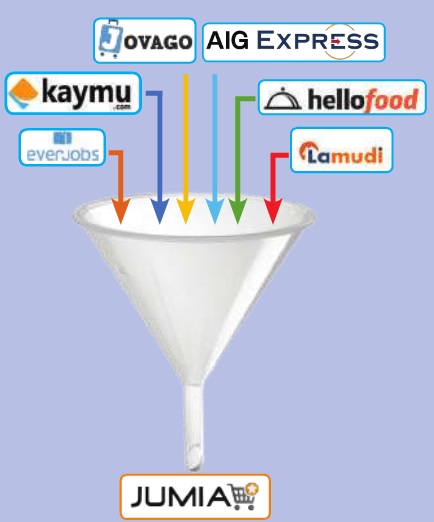
Reorganisation of major player sparks interest in e-commerce deals
Big is better. That seems to be the thinking behind Africa Internet Group’s decision to pool all its franchises, mainly online marketing offerings, under one brand name. And what that brand name would be seemed pretty obvious.
Although AIG had seven franchises in Uganda trading under Jumia, Lamudi, Hello Foods, Kaymu, Vendito, Everjobs, and Jovago, Jumia was the better known of all of them. And so AIG, which describes itself as the leading online marketing company in Uganda, rebranded to JUMIA. And the industry, it appears, is taking notice, writes Nicole Namubiru.
“We wanted to make the biggest internet brand in Africa by having the same name,” says Ron Kawamara; the head of former Hello Food, now renamed Jumia Food, “Jumia which was the more famous name of the AIG companies was a better choice to be used as the brand name.
“With this we would have all the other customers on the different platforms access other services using the same log-in.”
Under the strategy, it should become easier for the group’s customers to access the variety of goods and services on offer.
Under the rebranding Jumia, which is a general merchandise marketplace was merged with Kaymu (also an e-commerce marketplace) to become Jumia Market, Lamudi (real estate) becomes Jumia House, Hello Foods becomes Jumia Food, Vendito (online classified adverts), Ever jobs is Jumia Jobs, AIG Express (logistics) becomes Jumia Express , Jovago is Jumia Travel.
The AIG franchise, which is part of the German internet business building company; Rocket Internet with headquarters in Berlin and a presence in 116 countries and six continents, has a history of crafting bigger is better rebrands. In 2013, four of its house trading franchises; Vamido (Nigeria), Ubilista (Mexico) and Zamudi and House (Asia) rebranded into Lamudi.
Measuring the performance of the Jumia venture in Uganda is difficulty because of the lack of data on e-commerce transactions. But anecdotal information suggests that more people appear to be transacting online and on the Jumia platform specifically.
“E-commerce is slowly taking over,” says Micheal Niyitegeka, an ICT expert, “There are more people jumping on the online shopping band wagon.”
Commenting specifically about Jumia Food, Kawamara says numbers have been growing month to month.
“Many Ugandans have embraced the innovations and our partner restaurants are getting a lot of value from being listed on Jumia Food,” Kawamara says.
He says it’s a total change from the early years in 2014 when Ugandans were skeptical about e-commerce.
“We had cases where people ordered food but when it got delivered, they confessed to having been ‘just’ checking to see if it worked.
“Though these were registered losses, people seem to have taken on the trend as we barely get such instances lately,” he says.
Jumia reports fifteen million visits on its website every month across Africa. In Uganda, Kawamara says “the number of visits keeps increasing”.
“The number doubled the day after our merger,” he says without offering specific numbers.
Part of the growth of e-commerce can be attributed to the increasing use of mobile money by Ugandans. The number of mobile money subscribers grew by 6.1% up from 19.9million to 21.1million subscribers between October and December, 2015, according the regulator, the Uganda Communications Commission.
The number of specific transactions grew from 185million to 200.1million with the value increasing from Shs8.7trillion (Approx. $2.6 billion) to Shs9.4trillion (Approx. $2.8 billion).
Unlike Jumia, mobile money is not internet-based and most of the transactions are not e-commerce related. Experts say this is a major limitation.
“E-commerce,” Niyetegegeka says, “can only become more and more widespread with the spread of internet usage in the country.”
According to UCC, there was a 13.7 percent growth in mobile internet subscription and a 0.04 percent growth in fixed internet subscription between October and December, 2015. The estimated internet users increased by 6.3percent from 13 million to about 14 million.
Currently, the e-commerce growth is driven by a combined online and physical interaction model. Under Jumia Food, for example, customers can locate restaurants and order meals online but pay cash when meals are delivered at their location. The model applies to most Jumia transactions.
According to Niyetegeka, there are also cases where clients can pay using either credit or debit card. The trend is catching on with one major bank reporting issuance of up to 220 cards a month in its executive branch and about 40 visas in its a normal branch in the same period.
Fears of fraud
Though e-commerce may be a convenient way to transact, some people are still seen queuing up to pay utility bills with hard cash for reasons that vary.
Experts attribute the slow uptake of e-commerce to fear and uncertainty. Even adept users like Niyetegeka, who regularly transaction online and believe it is safe, say it is important to take precautions against online fraud.
“Now that more people will be transacting online, it is important to know that there are many fraudsters online. These may use one’s bank details to hack into their accounts and deduct money,” he says.
****
How to safeguard yourself when buying online:
Niyetegeka offers these tips:
- Watch out for fraudulent sites. Such sites can be identified by the number of visits they have. When the site has few visits, it may be an indicator it isn’t genuine.
- Take caution and ensure that the website has a security certificate. Short of this, the website maybe for fraudsters.
The good news is that there is a law that protects consumers from any shady occurrences. According to the Uganda Electronic Transactions Act Law No.8 2011; Part IV, Consumer Protection;
“A person offering goods or services for sale, hire or exchange through an electronic transaction shall provide to the consumers on the web site or electronic communication where the goods or services are offered, the following”- the full name and legal status of the person among other credentials.
 The Independent Uganda: You get the Truth we Pay the Price
The Independent Uganda: You get the Truth we Pay the Price



